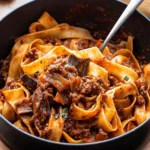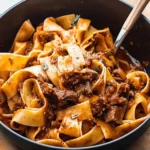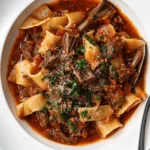These BBQ Pineapple Chicken Kabobs are a flavorful and colorful dish perfect for grilling season. Juicy chicken chunks are marinated in a sweet and smoky barbecue sauce, then skewered with vibrant bell peppers, onions, and pineapple for a tropical twist. Ideal for summer cookouts or a fun family dinner, these kabobs are easy to prepare and sure to please everyone at the table.
FULL RECIPE
Ingredients
- 1½ lbs boneless, skinless chicken breasts, cut into 1½-inch cubes
- 1½ cups fresh pineapple chunks
- 1 large red bell pepper, cut into 1½-inch pieces
- 1 large green bell pepper, cut into 1½-inch pieces
- 1 red onion, cut into 1½-inch chunks
- 1 cup barbecue sauce (your favorite variety)
- 2 tablespoons olive oil
- Salt and pepper, to taste
- Wooden or metal skewers
Directions
- If using wooden skewers, soak them in water for at least 30 minutes to prevent burning.
- In a bowl, combine the barbecue sauce and olive oil. Season with salt and pepper to taste.
- Place the chicken pieces in a large resealable bag or bowl. Pour in half of the barbecue mixture and toss to coat. Marinate in the refrigerator for at least 30 minutes.
- Preheat grill to medium-high heat and lightly oil the grates.
- Assemble the kabobs by threading chicken, pineapple, peppers, and onion alternately onto the skewers.
- Grill kabobs for 10–12 minutes, turning occasionally, until chicken is fully cooked and vegetables are lightly charred.
- Brush remaining barbecue sauce over the kabobs during the last few minutes of grilling.
- Remove from grill and serve hot.
Nutritional Information
- Calories: 290 per serving
- Protein: 30g
- Fat: 9g
- Carbohydrates: 22g
- Fiber: 2g
- Sugar: 16g
- Sodium: 500mg
The History and Popularity of Kabobs
Kabobs have a rich history that spans many cultures around the world. Originating from Middle Eastern and Mediterranean cuisines, they traditionally involve skewered and grilled meats combined with vegetables or fruits. The concept of cooking food on skewers over an open flame dates back centuries, making kabobs a timeless and universally loved method of grilling. The combination of chicken and pineapple in this recipe adds a modern twist that reflects the fusion of savory and sweet flavors, which has grown increasingly popular in contemporary grilling.
The Role of Pineapple in Grilling
Pineapple is an excellent fruit choice for grilling because it caramelizes beautifully when exposed to high heat, enhancing its natural sweetness. The acidity in pineapple also acts as a tenderizer for meats, particularly chicken, helping to break down proteins and resulting in a more juicy and tender texture. This tropical fruit complements smoky barbecue flavors perfectly, providing a refreshing contrast to the savory elements of the dish.
Choosing the Right Cut of Chicken
Using boneless, skinless chicken breasts for kabobs is a popular choice due to their lean quality and ease of cutting into uniform pieces. However, chicken thighs can also be used for a richer, juicier bite. The key is to ensure the chicken pieces are cut evenly so they cook uniformly on the grill, preventing dry or undercooked spots.
The Importance of Marinades
Marinating chicken before grilling is essential for adding flavor and moisture. The barbecue sauce-based marinade in this recipe not only infuses the meat with a smoky, tangy taste but also helps to lock in moisture during cooking. The addition of olive oil in the marinade aids in preventing the chicken from sticking to the grill while enhancing the overall texture.
Balancing Sweet and Savory Flavors
This recipe highlights the culinary technique of balancing sweet and savory elements. The sweetness from the pineapple and barbecue sauce contrasts with the savory chicken and vegetables, creating a complex flavor profile that excites the palate. This balance makes the kabobs suitable for a wide range of taste preferences, from those who enjoy bold smoky flavors to fans of fruit-enhanced dishes.
Vegetable Selection for Kabobs
Bell peppers and onions are classic choices for kabobs due to their ability to hold up well on the grill and their complementary flavors. Bell peppers add a slight sweetness and crisp texture, while onions contribute a subtle pungency that mellows when grilled. These vegetables not only enhance the taste but also add vibrant color, making the dish visually appealing.
Grilling Techniques and Tips
To achieve perfect kabobs, it is important to preheat the grill to medium-high heat and oil the grates properly. This prevents sticking and ensures even cooking. Turning the skewers occasionally allows for thorough caramelization and char without burning. Timing is crucial, as overcooking can dry out the chicken, while undercooking poses food safety risks.
The Nutritional Benefits of the Recipe
This dish offers a healthy balance of macronutrients. Chicken provides lean protein essential for muscle repair and maintenance. Pineapple contributes vitamins, particularly vitamin C, and antioxidants, which support immune health. Bell peppers and onions add fiber and additional vitamins, making the kabobs a well-rounded meal option.
Variations and Customizations
One of the great features of kabobs is their versatility. You can easily swap pineapple for other fruits like mango or peaches for a different sweet profile. Similarly, different vegetables such as zucchini, cherry tomatoes, or mushrooms can be added or substituted to match personal preferences or seasonal availability. Experimenting with different barbecue sauces, from spicy to honey-flavored, can also change the flavor dynamic.
Pairing Suggestions
These kabobs pair wonderfully with a variety of sides. Grilled corn on the cob, a fresh green salad, or rice pilaf all complement the smoky, fruity flavors. For beverages, consider a light beer, iced tea, or a tropical fruit punch to enhance the summery vibe of the dish.
Serving and Presentation Ideas
Serving kabobs straight from the grill maintains their juiciness and vibrant appearance. They can be plated over a bed of lettuce or alongside grilled vegetables for an attractive presentation. Garnishing with fresh herbs like cilantro or parsley adds a pop of color and fresh aroma.
Storage and Leftover Tips
Leftover kabobs can be stored in an airtight container in the refrigerator for up to three days. To reheat, it’s best to use an oven or grill to maintain the texture rather than a microwave, which can make the chicken dry. Leftover chicken and vegetables can also be removed from the skewers and added to salads, wraps, or stir-fries.
The Environmental Impact of Grilling
Grilling over charcoal or gas has a different environmental footprint. Using natural gas or propane tends to be cleaner than charcoal, which produces more particulate matter. Choosing sustainably sourced chicken and locally grown vegetables can further reduce the carbon footprint of this meal.
Health Considerations When Grilling
While grilling enhances flavor, it’s important to cook meats thoroughly to avoid foodborne illnesses. Avoid charring the meat excessively, as burnt portions can contain harmful compounds. Marinating meat beforehand may reduce the formation of these compounds during grilling.
The Social Aspect of Kabobs
Kabobs are inherently social foods, often enjoyed in group settings like barbecues or picnics. Their portable and customizable nature makes them ideal for sharing, allowing guests to tailor their own skewers. This interactive dining experience contributes to the appeal of kabobs as a crowd-pleasing option.
Seasonal Suitability
While kabobs are commonly associated with summer grilling, they can be enjoyed year-round using indoor grills or broilers. In colder months, pairing them with hearty sides like roasted potatoes or warm grains can create a comforting meal.
Economic Considerations
This recipe uses simple, accessible ingredients that tend to be affordable, making it an economical choice for feeding families or groups. Buying chicken in bulk and choosing seasonal vegetables can further reduce costs while maintaining quality.
Cooking for Dietary Restrictions
Kabobs are easily adaptable for various dietary needs. For gluten-free diets, ensure the barbecue sauce is free of gluten-containing ingredients. For lower-sodium diets, use a homemade barbecue sauce with reduced salt. Vegetarian or vegan alternatives can be made by substituting chicken with tofu or tempeh and using vegetable-based sauces.
The Science Behind Meat Tenderizing with Pineapple
Pineapple contains an enzyme called bromelain, which breaks down proteins in meat, effectively tenderizing it. This natural enzymatic action is why pineapple is often included in marinades for tougher cuts of meat. However, marinating for too long can cause the meat to become mushy, so timing is key.
Conclusion
BBQ Pineapple Chicken Kabobs are a delicious and versatile dish that brings together the best of grilling flavors with a tropical twist. Their balanced taste, nutritional benefits, and ease of preparation make them a fantastic option for casual meals or special occasions. By understanding the ingredients, cooking techniques, and possible variations, you can tailor this recipe to fit any palate or event. Whether served at a summer cookout or a weeknight dinner, these kabobs are sure to impress with their vibrant colors, juicy textures, and harmonious blend of sweet and savory notes.






